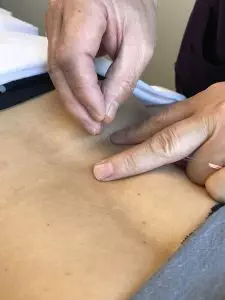-
 Art of Wellness Acupuncture & Traditional Chinese Medicine (TCM)11704 Wilshire Blvd, Suite 295, Los Angeles, CA, 90025
Art of Wellness Acupuncture & Traditional Chinese Medicine (TCM)11704 Wilshire Blvd, Suite 295, Los Angeles, CA, 90025
myartofwellness@gmail.com310-451-5522 Office Hours
MonClosedTue7:30 am --4 pmWed7:30 am --4 pmThu7:30 am -- 4 pmFri7:30 am -- 4 pmSat7:30 am -- 4 pmSunClosedOur office opens from Tuesdays to Saturdays 7:30 am to 4 pm, will be closed on Memorial day, Independent day, Labor day, Thanksgiving day, Christmas and New year.
-
Recent Posts
- How to Treat Shin Splints With Acupuncture and TCM
- How to Treat Dysautonomia With Acupuncture and TCM
- How to Treat Myofascial Pain Syndrome With Acupuncture and TCM
- How to Treat Costochondritis With Acupuncture and TCM
- How to Treat Ankylosing Spondylitis With Acupuncture and TCM
- How to Treat Gastroparesis With Acupuncture and TCM
- How To Treat Sleep Apnea With Acupuncture and TCM
- How To Treat Baker’s Cyst With Acupuncture and TCM
- How to Treat Sinusitis With Acupuncture and TCM
- How To Treat Sjogren’s Disease With Acupuncture and TCM
- How to Treat Raynaud’s Syndrome With Acupuncture and TCM
- How to Treat Autoimmune Disorders With Acupuncture and TCM
- Sign up to receive news and updates and get my free report:“The Top 10 Reasons to Try Acupuncture”

May 2024 M T W T F S S 1 2 3 4 5 6 7 8 9 10 11 12 13 14 15 16 17 18 19 20 21 22 23 24 25 26 27 28 29 30 31
diabetes
How to Treat Gastroparesis With Acupuncture and TCM
By Qineng Tan, L.Ac., Ph.D. and Xiaomei Cai, L.Ac. Ph.D.

Bloated stomach, indigestion? Acid reflux, regurgitating food? Abdominal pain or nausea? These can be signs of gastroparesis, also known as stomach paralysis. Acupuncture and TCM can help relieve gastroparesis symptoms.
What is gastroparesis? Gastric paralysis is a functional problem that occurs when the stomach muscles and the nerves that are connected to them aren’t activating normally. Weak stomach contractions lead to delayed emptying of the stomach into the small intestine.
Gastroparesis impacts your digestion, triggering uncomfortable symptoms, and limiting your ability to get proper nutrition and keep your blood sugar levels steady.
There are different types of gastroparesis.
- Diabetes-related gastroparesis – a side effect of diabetes
- Post-surgical gastroparesis – occurs after surgery, such as gallbladder or pancreas surgery, gastric bypass surgery, stomach surgery for ulcer, or hysterectomy
- Idiopathic gastroparesis – occurs without a clear explanation
Most people experience idiopathic gastroparesis, which means that doctors cannot necessarily identify what causes gastroparesis in many cases.
Some medications can delay stomach emptying, including narcotic pain medications like codeine, morphine, or oxycodone. Medications that work on nerve signals, such as those used to treat overactive bladder, can delay gastric emptying.
Scleroderma, an autoimmune condition that affects collagen production and smooth muscle tissues, can lead to gastroparesis. Parkinson’s disease, which affects nerve signals, can lead to delayed emptying of the stomach. Hypothyroidism can also affect nutrition and digestion, as can eating disorders, metabolic disorders, and/or chronic fatigue.
Acupuncture is a good modality for helping to relieve gastroparesis symptoms, because it works on the nervous system, to help restore the proper signaling to muscles.
Rumination Syndrome
Gastroparesis is sometimes confused with “rumination syndrome.” Rumination syndrome refers to the regular regurgitation of undigested food. People with this syndrome often regurgitate undigested food back up shortly after a meal. This condition is usually related to the functioning of muscles of the diaphragm and unconscious behaviors around chewing and swallowing.
Gastroparesis Symptoms

The most common signs of gastroparesis are bloating, pain, nausea, and feeling full quickly when you eat.
Other symptoms of gastroparesis include:
- Feeling full quickly when eating
- Nausea, feeling nauseous after eating
- Vomiting, spitting up undigested food after eating
- Bloating, bloated stomach, abdominal bloating, abdominal cramping, stomach cramps
- Belching, burping
- Acid reflux, heartburn
- High blood sugar, low blood sugar
- Lack of appetite
- Weight loss
- Malnutrition
Gastroparesis needs to be addressed, as it can compromise your overall health by blocking you from getting proper nutrition from your food.
Gastroparesis Treatment
Medical treatment for gastroparesis will depend on which type a person seems to have. If a person has diabetes-related gastroparesis, for example, treatment will necessitate better management of blood sugar levels.
Initial diagnosis usually involves imaging tests to see what is happening with the stomach and if there may be a blockage. Gastric motility tests help doctors see how your stomach muscles are working.
People will often be advised to change their dietary habits: possibly following a liquid diet for a period of time, or eating smaller meals throughout the day. You may be told to avoid fats and fiber, as these macronutrients can contribute to delayed stomach emptying.
In some cases, intravenous feeding or tube feeding may be necessary, if a person is severely undernourished due to gastroparesis.
Antiemetic medications may be prescribed to help with nausea and vomiting. Proton pump inhibitors may be recommended to help with acid reflux symptoms.
There are some medications that can help promote better gastric emptying by stimulating more muscular contractions. Erythromycin and metoclopramide are two drugs used to treat gastroparesis. These medications can have side effects, like stomach cramps, nausea and constipation. They can also have negative interactions with other medications.
If these treatments are not helping, surgical options may be offered. A gastrostomy or may be inserted to help drain the stomach. A jejunostomy tube can be placed to bypass the stomach, so that nutrition gets into the intestines. A pyloroplasty is an operation in which the muscular valve of the stomach is widened.
Newer, experimental treatments involve placing electrodes on the stomach to help activate contractions. Botox injections have also been tried, as a way to calm spasms in the stomach.
Acupuncture treatment can help relieve gastroparesis symptoms without side effects or invasive procedures.
Can Acupuncture Help Gastroparesis?

According to TCM theory, gastroparesis can be caused by a deficiency of stomach and/or spleen Qi. Part of the TCM treatment protocol for gastroparesis might involve using herbs and certain foods to help warm and nourish the spleen. Acupuncture treatment can help improve muscular function, as well help to relieve stomach pain.
The motility of the gastrointestinal system is controlled by nerve and electric impulses. Acupuncture, and in particular, electro-acupuncture, can have a positive effect on stimulating electrical activity and restoring neural pathways within the body.
Acupuncture has been shown to be helpful for relieving many GI symptoms, like nausea and bloating. This makes it a good treatment for many types of gastric disorders and stomach problems.
In one study, three different groups of people were all given acupuncture treatment, with emphasis on different acupoints used for each group. All three groups of patients had significant improvement in their gastroparesis symptoms.
Specifically, testing with barium meal showed that acupuncture helped improve the speed of stomach emptying. Patients also reported positive changes in their feeling of fullness after a meal and experienced less bloating.
One case study of a woman in her 60s who had been suffering for two years with gastroparesis symptoms showed significant improvement of nausea, timely stomach emptying, and energy levels after just four acupuncture treatments.
Another case study of a man in his 60s who presented with symptoms of fullness, stomach pain and distension, with delayed stomach emptying, ended with complete resolution of his symptoms after eleven acupuncture treatment sessions.
Acupuncture Near Me for Gastroparesis in Los Angeles
At Art of Wellness in West Los Angeles, Doctors Tan and Cai have over 35 years of experience helping people find relief from all kinds of gastrointestinal symptoms and stomach problems, including: IBS, stomach ulcer, colitis, Crohn’s disease, diverticulitis, nausea, diarrhea, and constipation. It’s worth trying acupuncture to see if it can help relieve gastroparesis symptoms for you.
*This article is for education from the perspective of Traditional Chinese Medicine only. The education provided by this article is not approved by FDA to diagnose, prevent, treat and cure human diseases. It should not stop you from consulting with your physician for your medical conditions. Traditional Chinese Medicine is based on Qi, which is an invisible force that usually cannot be observed by modern science. Because science focuses on testing ideas about the natural world with evidence obtained through observation, these aspects of acupuncture can’t be studied by science. Therefore acupuncture and Chinese herbs are often not supported by double-blind, randomized trials, and they are considered alternative medicine therapies in the United States.
How to Treat Autoimmune Disorders With Acupuncture and TCM
By Qineng Tan, L.Ac., Ph.D. and Xiaomei Cai, L.Ac., Ph.D.

Autoimmune disorders are on the rise, and they can be difficult to diagnose and treat. Acupuncture and TCM offer relief from autoimmune disease symptoms, while addressing the root of what might cause autoimmune disorders.
What is an autoimmune disease? The human immune system creates a variety of antibodies that are designed to fight off bacteria, viral infections, cancer cells, and toxins. An autoimmune disorder occurs when your body’s immune system malfunctions in some way and creates antibodies that attack healthy cells instead of dangerous ones. Different autoimmune disorders cause damage or dysfunction in different organs or systems of the body.
A recent study, based in the UK, looked at 19 prevalent autoimmune diseases and found that autoimmune disorders affect about one in ten people (13% of women and 7% of men).
Another study published in Arthritis and Rheumatology a few years ago, found that the most common biomarker of autoimmune disease—a high number of antinuclear antibodies (ANA)—has risen significantly across the US population, and particularly among certain groups, including adolescents, and people over 50. This study suggests that the chance of developing an autoimmune disorder is higher than ever.
Medical science has named over 80 different types of autoimmune diseases, but the understanding of what causes autoimmune disorders is still murky. Many people with autoimmune disorders go undiagnosed, and even when doctors are able to diagnose an autoimmune condition, there is no cure.
Autoimmune disorders do tend to run in families, which suggests that some people are more likely genetically disposed to develop an autoimmune disease. It is also common to have more than one autoimmune disorder concurrently. Having two or more autoimmune diseases is known as polyautoimmunity.
A few of the most common combinations of autoimmune disorders are:
- Scleroderma, autoimmune thyroid disease, and/or rheumatoid arthritis (RA)
- Myasthenia gravis and dermatitis herpetiformis
- Addison’s disease and vitiligo
TCM has treated many of these autoimmune disorders for centuries, although we may categorize them differently. The TCM view is that most autoimmune diseases are rooted in imbalances and deficiencies in the organ systems.
Stagnation of blood and Qi, and problems like excess heat and dampness in the body lead to inflammation, which is at the root of so many health problems. When systemic inflammation is reduced, the immune system can regain its proper functioning.
Acupuncture treatment is able to effect changes in the way cells are developing and functioning at the ectodermal and mesodermal layers. Acupuncture can stimulate the production of healthy cells, reduce inflammation, balance hormones, induce endorphin activity, and release peptides that improve immune function.
Top 20 Most Common Autoimmune Disorders
These are the most common autoimmune diseases, not necessarily in order. Some autoimmune disorders have significantly increased in numbers in recent years, including Celiac disease, Sjogren’s syndrome, and Graves disease. Some autoimmune conditions, like Hashimoto’s and pernicious anemia, seem to have decreased in numbers. Some autoimmune conditions have seasonal variations; for example, vitiligo is more commonly diagnosed in summer.
-

Swollen, stiff joints and painful swelling in limbs can be a symptom of lupus, RA, and other autoimmune disorders. Lupus – is an autoimmune disorder that disproportionately affects women and causes systemic inflammation, fatigue, swollen joints and limbs, and often a characteristic “butterfly rash” or “malar rash” across the face. Lupus flare-ups can be caused by stress or light exposure. According to TCM, lupus is often related to a build up of too much heat in the body, so acupuncture treatment for Lupus and herbal remedies will usually focus on removing blood stasis and clearing heat from the internal organs. TCM for Crohn’s can be used as an adjunct treatment, and may help people rely less on cortisone steroids to control inflammation.
- Crohn’s disease – is an autoimmune IBD (inflammatory bowel disease) that impacts the gastrointestinal tract, causing diarrhea, stomach pain, and bloody stool. Antibodies attack the gut bacteria that are normally a healthy part of digestion, causing inflammation and damage to the intestinal lining. Acupuncture treatment for Crohn’s disease can help reduce inflammation, repair tissues, and improve the balance of gut flora. It can also positively affect the parasympathetic nervous system that controls the action of the digestive tract, reducing stomach cramps and diarrhea.
- Rheumatoid Arthritis – an autoimmune disorder that causes joint pain and swelling, because antibodies attack the synovium, the soft tissue membranes that line joints. RA can also impact the blood vessels and cardiovascular system. RA can lead to bone loss over time, and people with RA are more prone to pneumonia and heart disease. TCM theory considers Rheumatoid arthritis to fall under the category of “Bi syndromes,” in which cold, wind and damp affect the body as pathogenic forces, causing blockages of Qi. Acupuncture can help reduce joint stiffness and pain.
- Graves disease – also known as hyperthyroidism, or overactive thyroid, Graves disease causes too much thyroid hormone to be produced, causing Graves disease symptoms like: goiter, enlarged thyroid, digestion problems, weight loss, tremors, sweating, insomnia, and infertility. Many people also have Graves ophthalmopathy, which causes bulging eyes, eye pressure, and blurred vision. TCM works to address yin deficiency and liver stagnation. Studies have shown that acupuncture and herbs can help balance the thyroid hormones.
- Multiple sclerosis (MS) – occurs when antibodies attack the myelin sheaths around nerves, leading to muscle weakness, numbness in limbs, dizziness, spasms, ataxia, or problems with balance, tremors, and trigeminal neuralgia (facial nerve pain). Acupuncture has been used to help relieve many of these symptoms of MS for hundreds of years, and can help improve and maintain motor skills.
-

Abdominal pain, stomach cramps, and gastrointestinal distress can be signs of Celiac disease, Crohn’s disease, or Ulcerative colitis. Celiac disease – is an autoimmune condition in which the body perceives dietary gluten to be a threat, triggering an immune response that creates inflammation and damage to the intestinal tract. Following a gluten free diet is important, and a TCM health practitioner is trained in nutrition to help patients make the necessary changes to ensure nourishment and prevent anemia. Acupuncture and herbs can also help repair intestinal tissues and bring down inflammation.
- Myasthenia Gravis – causes antibodies to attack nervous system receptors in the muscles, especially of the face, causing the eyelids to droop and making it difficult for a person to perform some movements related to the eyes, mouth, and throat. Muscle weakness and communications between the nervous system and the muscles can be helped with acupuncture treatment, and patients may be able to regain strength and reduce steroid usage.
- Scleroderma – is an autoimmune disease in which the body is producing too much collagen. Scleroderma causes hardening and thickening of the skin, and can affect connective tissues like cartilage. In extreme cases, Scleroderma can cause scarring on internal organs. TCM diagnosis may determine that Scleroderma is happening due to blood stagnation, and Chinese herbs have been shown to help manage collagen production.
- Hashimoto’s Disease or Hashimoto thyroiditis – also known as hypothyroidism, chronic thyroiditis, or low thyroid, Hashimoto’s causes too little thyroid hormone to be produced. Hashimoto’s low thyroid symptoms include: swollen thyroid, fatigue, weight gain, brain fog, and depression. Acupuncture addresses weak kidney and liver qi, and helps to balance TSH and thyroid hormone levels.
- Pernicious Anemia – is a specific type of autoimmune anemia that occurs when the intestinal lining is not able to absorb enough Vitamin B12. Aplastic anemia is another type of autoimmune anemia, in which antibodies are attacking the bone marrow, so it cannot produce enough blood cells. Acupuncture and TCM herbs can help boost blood deficiencies that cause anemia symptoms and help to repair the lining of the intestine to improve its function.
- Addison’s disease – also known as adrenal insufficiency, or adrenal fatigue, is an autoimmune disease that attacks the adrenal cortex, so that the body does not make enough cortisol. Addison’s disease symptoms include: fatigue, dehydration, loss of appetite, salt cravings, dizziness, low blood pressure, and joint pain. TCM views Addison’s primarily as a kidney deficiency that can be treated with acupuncture, herbs, and moxibustion to support kidney function.
- Vitiligo – an autoimmune disorder that affects melanin, or skin pigmentation, causing white patches on skin, and hair turning gray or white, and can affect eye color and vision. Acupuncture treatment and herbal remedies can be used as an alternative treatment for vitiligo, or as an adjunct to conventional treatments like light therapy and steroid medications, to help with repigmentation of skin and to help treat vitiligo at its roots.
- Ehlers-Danlos syndrome – affects the way the body produces collagen, leading to a connective tissues disorder, which in some cases creates hypermobile joints, stretchy and/or thin skin, and bruising. There are many different presentations of EDS, affecting different parts of the body. Acupuncture and Tuina massage can improve muscle tone, help with healing and reduce pain.
- Psoriasis – an autoimmune skin condition that causes too many skin cells to form, creating hard, scaly patches of skin, especially on the elbows and knees. As with many other autoimmune disorders, psoriasis tends to come and go; flare-ups can be triggered by a cut on the skin, an infection, or emotional stress. TCM theory says that psoriasis occurs due to pathogenic heat and dryness in the body; treatment will focus on strengthening lung Qi and clearing blood heat and stagnation.
- Autoimmune hepatitis – which has also been called plasma cell hepatitis or lupoid hepatitis, occurs when the immune system mistakenly attacks liver cells, causing fatigue, abdominal pain, and joint pain. People who already have an autoimmune disease, including Type 1 diabetes, Celiac disease, or Graves disease, are more likely to develop autoimmune hepatitis. Acupuncture and herbs are excellent for helping to repair the liver and improve liver functioning.
- Dermatitis herpetiformis – also known as Dhuring’s disease, is a bumpy, blistered skin rash, similar in appearance to herpes sores or hives. This autoimmune skin condition is related to Celiac disease, flaring up when a person ingests gluten. Acupuncture helps to relieve inflammation and itchy skin and promote healing, while clearing heat and stagnation from the lungs, which are often connected to skin disorders.
- Ulcerative Colitis – is an IBD (inflammatory bowel disease), similar to Crohn’s disease, in which the immune system attacks the lining of the colon, causing sores and inflammation to develop, which leads to frequent diarrhea, abdominal pain, and bloating. TCM uses herbs and acupuncture to clear heat and dampness from the colon and promote healing of the intestinal tissues. Moxibustion can help relieve cramping and diarrhea.
-

Severe headaches and brain fog can be signs of autoimmune encephalitis. Autoimmune Encephalitis (AIE) – causes inflammation of brain tissues, causing severe headaches, brain fog, and neck pain and stiffness. This condition can develop in response to an infection. Anti-NMDAR encephalitis can be related to a tumor called a teteroma. TCM treats the internal heat that leads to fevers, infections, and inflammation with cooling herbs, and helps reestablish connections throughout the central nervous system.
- Type 1 Diabetes – is an autoimmune condition in which the cells of the pancreas do not function properly to produce insulin. About 5-10% of people with diabetes have this type. In TCM, diabetes is known as “Xiao Ke,” the wasting disease, and is believed to be due to too much heat and dampness accumulating in the organs. Acupuncture treatment can help improve pancreatic function and insulin production.
- Guillain-Barre syndrome – also known as “acute inflammatory demyelinating polyradiculoneuropathy” (AIDP), is an autoimmune and neurological condition in which antibodies attack the myelin sheaths that surround the nerves, causing muscular weakness, neuropathy and hypertension. A combination of acupuncture and moxibustion treatment can relieve nerve pain and help improve the strength and coordination of the muscles, while helping to encourage the growth and repair of nerves.
Other autoimmune disorders include: ankylosing spondylitis.
Can Acupuncture Help Autoimmune Disorders?
Inflammatory cytokines are part of the immune response that creates inflammation in the body as a way to get rid of invasive pathogens and promote healing when we are injured. When the immune system is not functioning properly, there is excess inflammation, and this is the root cause of many types of autoimmune disease.
Acupuncture treatment has been proven to have a positive biological effect on the production of these cytokines, and may also prevent immune system white blood cells called macrophages from turning into pro-inflammatory cells.
Other TCM modalities, like cupping, activate the immune system and help manage nitric oxide levels. Nitric oxide levels play a role in T-cell regulation, which affects inflammation of joints in patients with systemic lupus and rheumatoid arthritis.
TCM treatment is a holistic way of treating autoimmune diseases that takes the whole person into consideration, treating physical symptoms of pain and stiffness, skin rashes, gastrointestinal distress, and more, while also helping to alleviate emotional and mental health problems like anxiety and depression. Acupuncture can also help improve cognitive function, memory problems, difficulty concentrating, and brain fog.
Acupuncture Near Me for Autoimmune Disorders in Los Angeles and Santa Monica
Autoimmune disorders require highly individualized treatment. If you or someone you know has an autoimmune disease, adding a highly experienced acupuncture practitioner to your healthcare team can make a big difference in your quality of life.
Drs. Cai and Tan and Art of Wellness in West Los Angeles have over 35 years of experience helping treat autoimmune disorders of all kinds. They can bring a new perspective to your healthcare plan and help you find relief from many autoimmune disorder symptoms.
*This article is for education from the perspective of Traditional Chinese Medicine only. The education provided by this article is not approved by FDA to diagnose, prevent, treat and cure human diseases. It should not stop you from consulting with your physician for your medical conditions. Traditional Chinese Medicine is based on Qi, which is an invisible force that usually cannot be observed by modern science. Because science focuses on testing ideas about the natural world with evidence obtained through observation, these aspects of acupuncture can’t be studied by science. Therefore acupuncture and Chinese herbs are often not supported by double-blind, randomized trials, and they are considered alternative medicine therapies in the United States.
How to Treat Diarrhea With Acupuncture and TCM
By Qineng Tan, L.Ac., Ph.D. & Xiaomei Cai, L.Ac., Ph.D.

Chronic diarrhea, explosive diarrhea, diarrhea after eating? Diarrhea may be related to IBS (irritable bowel syndrome), or an IBD (inflammatory bowel disease), or a reaction to a food allergy, parasites, or stress. Acupuncture and TCM offer an alternative diarrhea treatment, so you can get relief from stomach pain and diarrhea.
Why Do I Have Diarrhea?
There can be many different causes of diarrhea, also known as loose stool. Acute diarrhea, which only lasts one or two days, will usually go away on its own.
Watery diarrhea that lasts a few days is usually due to food poisoning. Eating something that was rotten, or not cooked properly to destroy bacteria, can cause vomiting and diarrhea. Watery diarrhea can also happen when you have some type of viral infection, such as the “stomach flu.”
Chronic diarrhea, or persistent diarrhea, which lasts for weeks, or bouts of diarrhea that come and go frequently, may be related to IBS symptoms, IBD symptoms, Celiac disease, or some other problem.
More than 6% of adults in the U.S. report having chronic diarrhea. Chronic diarrhea in children is also a serious health concern worldwide.
Top 10 Causes of Diarrhea
Diarrhea is a common condition that everyone experiences sometimes. Usually it is temporary, but it can become persistent and serious enough to require diarrhea treatment. The most common reasons a person experiences loose bowel movements include:
- Bacterial infection, traveler’s diarrhea, food poisoning, unsafe drinking water
- Viral infection, such as rotavirus, viral gastroenteritis, stomach flu
- Parasite infection, such as giardiasis
- Food allergy, food intolerance, food sensitivity, Celiac disease
- Reaction to medications like antibiotics, antidepressants, or Metformin
- Reaction to radiation therapy, cancer treatment
- IBS – diarrhea, constipation, and stomach cramps are common IBS symptoms
- IBD – colitis or Crohn’s disease, inflammatory autoimmune disorders that affect the gut
- Malabsorption of food, poor absorption of nutrients
- Menstrual cycle or Perimenopause – changes in hormones/estrogen can cause diarrhea
Certain foods can cause diarrhea, including: too much coffee, artificial sweeteners like mannitol and sorbitol, and red food coloring. Magnesium supplements can also cause loose stools.
If diarrhea lasts more than a few days, it is important to seek healthcare advice. Chronic diarrhea can lead to dehydration and fatigue, and may be happening because of some more serious condition that needs to be addressed.
What Causes Chronic Diarrhea?

Bouts of diarrhea that keep recurring can be a symptom of disorders such as:
- IBD (inflammatory bowel disease) – the most common IBDs are ulcerative colitis and Crohn’s disease. IBD symptoms usually include bloody diarrhea and abdominal pain. IBDs can cause chronic or recurring diarrhea, which can lead to dehydration, fatigue, and weight loss. IBDs can be mild, or so serious that they cause long-lasting damage to the gastrointestinal tract.
- Ulcerative colitis – an autoimmune disorder that causes inflammation and ulcers, or open sores, in the lower gastrointestinal system, including the colon and rectum.
- Crohn’s disease – an autoimmune disorder that causes inflammation mainly in the small intestine, but can affect any part of the GI tract.
- IBS – Irritable bowel syndrome can seem similar to IBDs, also causing recurring bouts of diarrhea and stomach pain. However, IBS is considered a functional gastrointestinal disorder. It is quite common. People with IBS symptoms may have alternating bouts of diarrhea and constipation. People who tend to have more diarrhea-dominant IBS have “IBS-D.”
- Celiac disease – an autoimmune disorder in which a reaction to eating wheat gluten causes serious inflammation of the GI system, leading to abdominal pain, bloated stomach, diarrhea, malnutrition, fatigue, and skin rashes.
With these conditions, diarrhea is brought on periodically—sometimes alternating with constipation, as in some cases of IBS—by factors having to do with the diet or stress, or with autoimmune processes.
Some surgeries that affect the gastrointestinal organs—like gastric bypass, gastric sleeve, or gallbladder removal—can cause chronic diarrhea.
Chronic diarrhea can be caused by an inability of the intestinal walls to absorb nutrients, and/or of the walls of the colon to absorb liquid. It may also be due to excessive action of the intestine in terms of peristalsis, the squeezing of the intestine to move matter through.
Diarrhea Treatment
Acute diarrhea usually goes away on its own in a day or two. Often, people will use OTC remedies for diarrhea and stomach pain, such as Immodium or Pepto-Bismol.
If you have been experiencing persistent diarrhea and seek medical advice, a doctor will perform tests to figure out what is causing the diarrhea, and will offer electrolyte fluids to help with dehydration. Blood tests or a stool test will show if the diarrhea is due to a bacterial infection or parasitic infection.
If chronic diarrhea is determined to be related to a medication you are already taking, then that may need to be adjusted.
Discovery of IBS or an IBD usually involves more diagnostic testing, including a colonoscopy and/or endoscopy, to see if there is inflammation or blockage in the GI tract.
Medical treatment for IBS may involve being offered antispasmodic medications that relax the intestinal walls and slow down the movement of the bowels and can help relieve stomach cramps and abdominal cramping. Dietary changes and behavioral therapy may be recommended.
Pharmacological treatment for IBDs like colitis and Crohn’s usually involves taking a combination of anti-inflammatories and immunosuppressants, to reduce inflammation in the gut and to block the inappropriate autoimmune responses that are triggering the inflammation. Unfortunately, steroids and medications like Xeljanz can cause other side effects and health problems.
Medical treatment for chronic diarrhea may help relieve symptoms and reduce the frequency of bouts of diarrhea, but it does not necessarily address the underlying causes of diarrhea.
Acupuncture and TCM offer an effective alternative treatment for diarrhea that is more suited to each patient’s individual situation.
Can Acupuncture Help Diarrhea?

Chronic diarrhea, according to TCM theory, is usually considered to be related to the health of the spleen. In TCM, the organ systems all interact harmoniously, unless there is imbalance. The imbalance of one organ system may throw off other systems, leading to various symptoms.
In TCM, the spleen is responsible for breaking down the nutrients from food and converting them into energy. If the spleen is not functioning properly, watery stool is often the result. Diarrhea, stomach pain, and other symptoms may differ from person to person, depending on how the spleen is interacting with the liver, stomach, or kidneys.
Common Chinese Medicine diagnosis patterns for chronic diarrhea include:
- Spleen Deficiency with Liver Qi stagnation: mucus in the stool, abdominal pain, cramping, gassiness, bloated stomach, irritability, and feelings of depression
- Spleen Deficiency with Stomach deficiency: watery stools, poor appetite, feeling full quickly, stomach distended after eating, pallor, and fatigue
- Spleen Deficiency with Kidney Deficiency: diarrhea in the morning, partially digested food in the stool, abdominal pain, lower back pain, knee pain, feeling cold
Acupuncture treatment for diarrhea, which may include moxibustion and herbs, aims to support the health of the spleen and other organs. Acupuncture has been shown to help relieve diarrhea and constipation related to IBS. Acupuncture treatment can also help with reducing stress and anxiety, which are common triggers for IBS symptoms.
Acupuncture can also help with diarrhea due to IBDs like ulcerative colitis and Crohn’s disease by reducing inflammation and helping to balance immune responses. TCM treatment for Crohn’s disease or colitis, incorporating nutrition and herbal supplements, can help improve the gut biome and strengthen the lining of the intestinal walls.
Acupuncture for Diarrhea Near Me, Los Angeles, West L.A., and Santa Monica
TCM treatment with an experienced acupuncturist near me can be very beneficial for anyone dealing with ongoing gastrointestinal distress. Both adults and children can find relief from diarrhea, constipation, stomach cramps, bloating, and abdominal pain related to conditions like IBS, IBDs, or celiac disease through acupuncture and herbs. At Art of Wellness, we have over 30 years of experience helping people with gastric disorders of all kinds.
*This article is for education from the perspective of Traditional Chinese Medicine only. The education provided by this article is not approved by FDA to diagnose, prevent, treat and cure human diseases. It should not stop you from consulting with your physician for your medical conditions. Traditional Chinese Medicine is based on Qi, which is an invisible force that usually cannot be observed by modern science. Because science focuses on testing ideas about the natural world with evidence obtained through observation, these aspects of acupuncture can’t be studied by science. Therefore acupuncture and Chinese herbs are often not supported by double-blind, randomized trials, and they are considered alternative medicine therapies in the United States.
How to Treat Celiac Disease With Acupuncture and TCM
By Qineng Tan, L.Ac., Ph.D. & Xiaomei Cai, L.Ac., Ph.D.

Do you have digestive problems like a bloated stomach, diarrhea, and abdominal pain? Unintentional weight loss, fatigue, skin rashes? These can all be signs of Celiac disease. Different from food allergies, Celiac is a serious autoimmune disorder that can lead to malnutrition and other debilitating health problems. TCM herbs and acupuncture treatment offer a good alternative way of managing Celiac disease and gluten intolerance symptoms.
In recent years, you have probably heard a lot of people saying they are switching to a gluten free diet because they have a gluten allergy or gluten intolerance. Sometimes people may just be trying to see if they feel better when they cut out wheat products, or they are going on a low carb diet to help them lose weight. Other people may be experiencing symptoms like diarrhea and nausea and hope that going on an IBS diet will help.
What is gluten? Gluten is a protein that is present in some grains, including wheat, barley, and rye. When a person has Celiac disease, gluten is perceived by the immune system as a dangerous foreign substance, triggering an immune response. Antibodies (white blood cells) are produced as a reaction to gluten entering the body, and the antibodies end up causing inflammation and damage to the inside of the intestinal tract.
This damage to the small intestine is called villous atrophy, and this is what causes inflammation and malabsorption of nutrients, leading to the myriad symptoms of Celiac. Celiac symptoms vary widely, and can include both digestive problems, and other conditions, like anemia, that stem from the lack of proper nourishment to the body.

There is such a thing as a true wheat allergy, which for some people causes respiratory problems like difficulty breathing and nasal congestion, and other allergy symptoms like swelling and itching around the mouth and throat, hives or other itchy skin rashes, and headaches. Wheat allergies are a response to chemical compounds in wheat, which is found in a wide variety of food products. In some cases, exposure to wheat can cause anaphylaxis, which requires emergency medical attention because it can involve trouble breathing and swallowing, chest tightening, throat swelling, dizziness, and fainting.
Some doctors now recognize gluten intolerance or non-celiac gluten sensitivity as a separate condition from Celiac disease. For some people, gluten causes an immune response and symptoms, but not the same kind of damage to the intestines that Celiac does. If gluten intolerance is suspected, then following a gluten free diet for a period of time and noticing if symptoms clear up is usually the recommended course of action.
Celiac disease tends to run in families, and so is considered to be passed genetically. People can begin to show signs of Celiac at any age. It is estimated that at least 1% of the population has Celiac disease, but that number may be significantly higher, as it is still not a very well understood condition. Many people who have Celiac disease are unaware of it, or have been misdiagnosed with other conditions. Researchers believe that the incidence of Celiac disease is increasing worldwide, probably due to some environmental factors.
Acupuncture and TCM herbs provide a holistic way to treat Celiac disease, relieving the painful symptoms and providing detailed guidance for lifestyle and dietary changes that can help people manage Celiac and gluten intolerance. Nutrition is considered to be one of the primary branches of TCM, along with acupuncture and herbs. A TCM practitioner will be able to give you dietary recommendations far beyond just telling you to eat gluten free foods.
Top 10 Celiac Disease Symptoms
People can experience a variety of gluten intolerance symptoms, including digestive problems, allergy symptoms like skin rash, and other symptoms related to nutritional deficiency, like anemia and weight loss. Signs of gluten intolerance may be different in children, who are more susceptible to malnourishment that can lead to a failure to thrive.

Celiac symptoms include:
- Fatigue
- Weight loss
- Diarrhea, pale colored stools, foul-smelling, fatty, greasy stool
- Abdominal bloating, bloated stomach, gas, stomach pain, abdominal pain
- Nausea, vomiting
- Constipation
- Headache, headaches, migraines, migraine headaches
- Skin rash, mouth ulcers, mouth sores, canker sores
- Neuropathy, numbness or tingling in hands and feet, problems with balance, joint pain
- Cognitive problems, foggy head, difficulty concentrating
Celiac can lead to anemia, iron deficiency, loss of bone density (osteoporosis), weak bones, soft bones, bone loss (osteopenia), joint pain, or arthritis. People can also have liver problems, including fatty liver.
Dermatitis herpetiformis is a specific type of skin rash that causes itching and blisters to appear, primarily on the knees, elbows, torso, top of the head, and buttocks.
Women may find that celiac disease affects their hormones, menstrual periods, and can have an impact on fertility, even causing recurrent miscarriages.
Celiac disease can also contribute to infertility and low sperm count in men.
When a child develops celiac disease, the inability to absorb nutrients from food can cause problems with normal growth, such as short stature, delayed puberty, and damage to tooth enamel. Developmental disorders and behavioral issues can also be related to celiac, like ADD/ADHD and irritability.
In extreme cases, Celiac can cause seizures.
Celiac Disease Diagnosis and Treatment

Going through the process of being diagnosed with Celiac disease or gluten intolerance is quite complicated and involves multiple tests. From the medical standpoint, it is best that you do not eliminate gluten or change your diet before the testing, so that it can accurately show how gluten is affecting your immune system and your intestines.
First, you will probably have a blood test that looks for certain antibodies that would indicate an autoimmune reaction to gluten. Some people may test negative for antibodies, and yet still have Celiac, though, so this blood testing is not enough to be conclusive. Genetic testing may be done, which looks for specific antigens to rule out Celiac. If testing shows that a person has antibodies, and they also have a specific type of skin rash (dermatitis herpetiformis), that is usually enough for a doctor to give an official diagnosis of Celiac disease.
Endoscopy is an imaging test which uses a little camera to see if there is damage to the intestinal lining. They will also take some tissue samples from the lining of the intestine to check for inflammation and damage. The results of these tests may lead to a formal Celiac diagnosis. People will often need to have an endoscopy to find out if they have Celiac disease, and then possibly repeated endoscopies to see if the inflammation is getting better or worse.
Sometimes people will try figuring out what is going on themselves with a food sensitivity test or food intolerance test kit that you can do at home and send in for results. Food allergy testing may give you some information as to whether you have a reaction to a specific allergen (egg allergy, milk allergy, peanut allergy, shellfish allergy) or have a food sensitivity, but they cannot tell you if you really have Celiac disease or gut inflammation.
Going through the diagnostic process for autoimmune diseases like Celiac disease can be exhausting in and of itself. Meanwhile, you aren’t yet getting treatment for your symptoms. The only treatment available in conventional medicine for Celiac disease really is to follow a gluten free diet. Most doctors are not able to do much beyond give you a list of foods you shouldn’t eat, or refer you to a dietitian.
TCM has the ability to provide more comprehensive care for people with Celiac disease, and many other autoimmune conditions. Acupuncturists are highly trained professionals when it comes to offering patients detailed guidance for following an effective Celiac disease diet.
Can Acupuncture Help Celiac Disease and Gluten Intolerance?

TCM has more to offer than just acupuncture treatment and herbal medicine. Nutrition is one of core competencies every TCM practitioner must master.
Acupuncture treatment can help relieve digestive symptoms like abdominal pain and bloating, and also have a positive impact on the system malfunctioning that leads to autoimmune reactions. With Chinese herbs, we are able to get very potent nutrients into the body that wouldn’t normally come from food. For people with Celiac, or other problems like food allergies or sensitivities, malnutrition due to malabsorption is a real problem.
A TCM nutrition approach can help restore the body’s health with foods and herbs better than a simple elimination diet for Celiac disease can. An acupuncturist listens carefully to the particular symptoms and sensations you describe. These provide important clues as to which organ systems are involved, and where yin and yang are out of balance. Then TCM provides a framework for tailoring the treatment and food plan for Celiac disease to each individual’s needs.
According to TCM theory, the stomach and spleen are responsible for digesting food. Celiac disease symptoms are, according to a typical TCM diagnosis, related to a spleen deficiency. When Qi in the spleen is weak, the body is not getting the nutrients it needs. Building up the strength of the spleen will often be the focus of the acupuncture portion of the treatment. Herbs and specific nourishing foods will be recommended, which will help anemia and soothe the digestive tract.
Acupuncture Near Me For Celiac Disease, West Los Angeles
Autoimmune diseases like Celiac disease can be especially frustrating because they seem to take over your whole life. Not only physical health, but mental health is compromised. Treatment options are limited. Fortunately, TCM offers a complementary form of medicine that is able to provide multi-faceted care for autoimmune disorders like Celiac, including: Crohn’s disease, Type 1 diabetes, hyperthyroidism, Lupus, rheumatoid arthritis, fibromyalgia, and multiple sclerosis (MS). Acupuncture treatment can help reduce feelings of anxiety and depression as you learn to manage your illness.
If you or someone you know has been suffering from digestive issues, and you suspect it may have something to do with gluten intolerance or Celiac disease, be prepared to go through testing, but also give some thought to adding a TCM provider to your health care team. At Art of Wellness, we have over 35 years of providing excellent care through TCM treatments, including expert nutrition services. It is like getting an acupuncturist and dietitian in one.
*This article is for education from the perspective of Traditional Chinese Medicine only. The education provided by this article is not approved by FDA to diagnose, prevent, treat and cure human diseases. It should not stop you from consulting with your physician for your medical conditions. Traditional Chinese Medicine is based on Qi, which is an invisible force that usually cannot be observed by modern science. Because science focuses on testing ideas about the natural world with evidence obtained through observation, these aspects of acupuncture can’t be studied by science. Therefore acupuncture and Chinese herbs are often not supported by double-blind, randomized trials, and they are considered alternative medicine therapies in the United States.
How to Quit Smoking With Acupuncture and TCM
By Xiaomei Cai, L.Ac., Ph.D. & Qineng Tan, L.Ac., Ph.D.

Have you been trying to stop smoking, but are having a hard time quitting? You know that quitting smoking will definitely improve your overall health and longevity, but that doesn’t mean it’s easy to do. Acupuncture treatment can reduce cravings, alleviate withdrawal symptoms of nicotine, and help relieve anxiety you feel when you stop smoking.
Smoking tobacco causes several million unnecessary deaths every year, and is associated with multiple chronic diseases, including lung disease, cardiovascular disease, diabetes, lung cancer and other types of cancer. But deaths related to smoking are just the tip of the iceberg. According to the CDC, over 16 million Americans are currently living with a chronic disease caused, at least in part, by smoking. Smoking increases the risk of stroke, erectile dysfunction in men (ED), low sperm count, and autoimmune diseases such as rheumatoid arthritis. On average, smoking takes ten years off a person’s life.
Why do we keep doing this to ourselves? Because once you have a smoking habit, quitting smoking is very hard. Tobacco contains a natural chemical called nicotine. Nicotine is a highly addictive substance. It acts upon the neurotransmitters in the brain that release dopamine: the “feel-good” chemical. When you inhale tobacco smoke, nicotine goes directly to your brain, and you get an immediate “reward” in the form of dopamine. Once your brain gets used to this reaction, it wants more of it. Even when you know you should stop smoking, and you want to quit, a part of your brain is signalling you not to stop.
Vaping, or smoking from a vape pen, or e-cigarette, is the latest trend. There has been some suggestion that this form of smoking causes less damage than cigarettes do, because Juul pens don’t have many of the toxic additives that are in regular cigarettes. So far, researchers don’t know how long-term vape use will affect people’s overall health. However, it is clear that people who vape can easily become just as addicted to nicotine as smokers of cigarettes, cigars, and pipes do.
Once the brain has become attuned to the dopamine reaction caused by nicotine, a very powerful social-emotional component is added to the physical, chemical component. Being in a place where you have smoked in the past, seeing a friend who smokes, smelling smoke in the air, and of course, seeing an ad for cigarettes–all these sorts of cues in your daily environment can have a dramatic impact on your desire to smoke.

Almost half of all smokers in the U.S. make an attempt to quit smoking each year. But, obviously, people fail in their attempts to stop smoking all the time. Nicotine withdrawal symptoms include intense anxiety. When faced with a powerful combination of physical and emotional stress, most people will return to that quick fix. Even when a person develops serious problems due to smoking, like a constant cough, emphysema, sleep apnea/snoring, infertility, acid reflux/heartburn, loss of smell and taste; even when a person knows that second hand smoking can hurt their loved ones, they still may find it impossible to quit. People need help to quit smoking.
Typical smoking cessation aids include nicotine gum or patches, medications, and programs designed to educate and support people as they try to overcome smoking addiction. While these methods offer help, they do not work for everybody. Most people have to try to quit smoking many times and try different methods before finding success.
Many people gain weight when they quit smoking, because the cravings for a cigarette are replaced by cravings for sweets or other foods and drinks that keep your hands and mouth occupied. It’s more than just an oral habit, though; nicotine affects the way your body uses insulin and releases glucose, so when you quit smoking, there is a very real change in blood sugar levels and a subsequent desire to eat more carbohydrates. When it feels like you have to choose between two different risk factors–being a smoker, or being overweight–,it may seem like a hopeless situation.
TCM for smoking cessation offers a different, multi-pronged approach. With acupuncture treatment for nicotine addiction, we can work on several of the problems smoking causes at the same time. Using acupuncture to stimulate specific pressure points for reducing cravings and alleviating symptoms of smoking withdrawal is only one way that TCM can help people quit smoking and regain good health. Our TCM detox program may also be helpful.
Top 10 Symptoms of Nicotine Withdrawal
When you try quitting smoking “cold turkey,” you will probably feel more severe symptoms of withdrawal for the first few days. Withdrawal symptoms can last for several weeks. Nicotine withdrawal symptoms include:
- Intense cravings for a cigarette that last for 5-10 minutes
- Feelings of anxiety and stress
- Food cravings, weight gain, rise in blood sugar
- Sleep problems, insomnia
- Persistent cough, “smoker’s cough”
- Flu-like symptoms: fever, fatigue, body ache, headache
- High blood pressure, fast heart rate
- Memory problems, difficulty concentrating
- Dizziness
- Constipation, bloated stomach
Medical Approach to Quitting Smoking
Nicotine replacement therapy (NRT) has been the common form of help for nicotine withdrawal for decades. This involves using nicotine patches, nicotine gum, or lozenges, which help people gradually wean themselves off of nicotine by lowering the dose over time. Nicotine patch side effects can include a rapid heart beat, dizziness, headaches, and nausea.
Medications such as Zyban and Chantix are also used to help people quit smoking. Zyban (Bupropion) is also known as Welbutrin, which is used to treat depression. A prescription medication called Varenicline (Chantix) is the newest medical treatment available to help people stop smoking. Varenicline works by blocking the receptors in the brain that react to nicotine to stimulate dopamine production. Varenicline is still fairly new, and researchers do not yet know the long-term effects of taking it. Common Chantix side effects include nausea, insomnia, and headaches; more serious psychiatric reactions, such as depression and suicidal ideation have also been reported. Drug interventions for smoking cessation are more effective when combined with education and counseling.
The most effective methods to help people stop smoking treat both the brain chemistry that is causing nicotine addiction and the emotional symptoms that arise when quitting. TCM methods of acupuncture and herbs are naturally able to help address addiction because they work on the whole person–physically, mentally, and spiritually.
How Can Acupuncture Help You Quit Smoking?

In conventional medical terms, we mostly think of cigarette smoking as being harmful to the lungs, due to smoke inhalation, and the cardiovascular system, due to the well-known fast heartbeat we associate with nicotine use. In TCM, we do consider that smoking weakens the lungs, but this, in turn, causes problems in the other major organ systems of the body. A buildup of heat in the Heart and Stomach can lead to stagnant Liver Qi. These forces are what cause the withdrawal symptoms of anxious feelings, heart palpitations, irritability, food cravings, and poor sleep. With acupuncture and herbs, we work to clear heat and detoxify the lungs and all of the organs.
A specific set of points on the outer ear are often used to help combat the cravings associated with overcoming addictions of all kinds, including nicotine dependence. Often we will send a patient home with small ear seeds fixed to these points so that they can be squeezed and stimulated whenever you feel an urge to smoke. This will also help with food cravings and prevent overeating and weight gain when you quit smoking.
Acupuncture helps to release endorphins, replacing the familiar dopamine hit with a different sense of relaxation. Endorphins promote a sense of wellbeing and relieve pain. Dopamine works on the reward center of the brain, causing a mental and emotional reaction that leads to addiction. Acupuncture treatment works holistically to help relieve emotional pain–symptoms of anxiety and depression–by positively impacting neurochemical activity. Shifting from dopamine dependence to more abundant endorphins and serotonin will help restore restful sleep.
A controlled trial study compared patients who received acupuncture, patients who received acupuncture and education and counseling, and patients who received sham acupuncture to help them quit smoking over a period of four weeks. The percentage rate of patients who had quit smoking after 18-month follow up was highest among those who received acupuncture, and especially highest among those who had acupuncture and counseling.
A study of almost 3000 people who received acupuncture treatment for smoking over an eight week period showed that the treatment helped many people abstain from cigarettes, and helped many more to cut back on how many cigarettes they smoked.
Chinese Medicine Near Me to Stop Smoking in the Great Los Angeles Area
The decision to quit smoking for good can be a life-changing one. But for most people, it’s also one of the most difficult things they will ever do. Cigarettes are addictive, and to stop smoking, you may need professional help. If you’ve already tried NRT and not been able to finally quit, you may want to consider trying the TCM approach. Whether you chain smoke or only vape socially, whether you are quitting smoking because you want to increase your chances of getting pregnant, or you have lung cancer stage 4, it is never too early or too late to stop smoking. Acupuncture for smoking cessation can help you get past the cravings for cigarettes that make it so hard to quit. Acupuncture and herbs can not only help you kick the habit, but can also help you get rid of that cough, brighten your skin, and sleep better. Most of all, you will have made an important choice to prioritize your health and prevent chronic illness from taking hold later in life.
*This article is for education from the perspective of Traditional Chinese Medicine only. The education provided by this article is not approved by FDA to diagnose, prevent, treat and cure human diseases. It should not stop you from consulting with your physician for your medical conditions. Traditional Chinese Medicine is based on Qi, which is an invisible force that usually cannot be observed by modern science. Because science focuses on testing ideas about the natural world with evidence obtained through observation, these aspects of acupuncture can’t be studied by science. Therefore acupuncture and Chinese herbs are often not supported by double-blind, randomized trials, and they are considered alternative medicine therapies in the United States.


